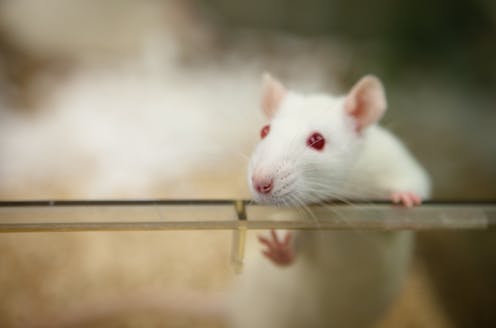Sperm from older rats passes on fewer active genes to offspring because of epigenetic changes
- Written by Alexander Suvorov, Assistant Professor of Environmental Health Sciences, University of Massachusetts Amherst

The Research Brief[1] is a short take about interesting academic work.
The big idea
The sperm of older rats differs from that of younger rats in ways that may affect embryo development, according to recently published research.
Sperm carries not only genes, but also instructions that determine which genes will be turned on or off in offspring. These directions are known as epigenetic information[2].
In the rats we studied, age had a profound effect on the activity of many genes in sperm. We found age affected two epigenetic mechanisms in particular: DNA methylation[3], which chemically alters DNA to block specific genes, and small RNA[4], another method of gene silencing.
Why it matters
In developed countries, people are having their first child later than ever before. In the U.S., the number of men between the ages of 35 and 44 fathering children increased 50% over the past three decades[5]. A downside of this trend is that children conceived by older fathers have a higher risk of adverse health conditions.
These conditions include different forms of cancer[6], schizophrenia[7], autism spectrum disorder[8], bipolar disorder[9] and attention deficit/hyperactivity disorder[10], among others.
It is now clear the quality of information transferred by sperm decreases with age. We still do not know, however, if these changes occur through an accumulation of mutations or some other mechanisms[11]. Our rat data suggests epigenetic changes are one culprit.
How we do our work
In our experiments, we collected sperm from 65-day-old rats and 120-day-old rats. These ages correspond approximately to 20-to 25- and 40- to 45-year-old humans. We analyzed the sperm of these animals using methods based on DNA sequencing and found the sperm of older rats had very different epigenetic profiles – or operating instructions – than younger rats did.
In older rats, 5,319 DNA sites had different levels of methylation, an epigenetic mechanism that occurs when methyl group (-CH3) is added to DNA[12]. Because even single instances of methylation may result in switching off nearby genes[13], the number of sites we found is enough to affect 5% of all rat genes.
Older rat sperm also had different concentrations of small RNAs, which are a large class of tiny molecules that can interfere with the expression of genes. We found that 3.6% of all identified small RNAs[14] were different in older rats. Like DNA methylation, changes in small RNA can affect the activities of multiple genes[15].
Using computational algorithms, we identified the genes affected by these epigenetic mechanisms – 3,066 were regulated by DNA methylation and 4,950 by small RNA, with significant overlap[16]. Most of the genes we identified regulate embryonic development, including that of the brain and other organs.
Our study analyzed only sperm – it did not study offspring. But knowing which genes are likely to be turned off – and their specific functions – allows us to confidently predict what will go wrong in the development of rat pups fathered by older rats. If the same mechanism exists in humans, epigenetic changes in sperm may be partly responsible for the greater risk of certain health conditions in children conceived by older fathers.
What still isn’t known
Emerging research shows similar age-related changes do occur in human sperm[17]. But the epigenetic study of human sperm is in its infancy. Unlike genetic information, which is fixed, epigenetic information is highly flexible and can be altered by many lifestyle and environmental factors[18]. My colleagues and I hope our research will help to develop future therapies that can address the health of children before they are even conceived.
[Insight, in your inbox each day. You can get it with The Conversation’s email newsletter[19].]
References
- ^ Research Brief (theconversation.com)
- ^ epigenetic information (www.cdc.gov)
- ^ DNA methylation (doi.org)
- ^ small RNA (doi.org)
- ^ increased 50% over the past three decades (europepmc.org)
- ^ cancer (doi.org)
- ^ schizophrenia (doi.org)
- ^ autism spectrum disorder (doi.org)
- ^ bipolar disorder (doi.org)
- ^ attention deficit/hyperactivity disorder (doi.org)
- ^ accumulation of mutations or some other mechanisms (doi.org)
- ^ methyl group (-CH3) is added to DNA (doi.org)
- ^ single instances of methylation may result in switching off nearby genes (doi.org)
- ^ identified small RNAs (doi.org)
- ^ activities of multiple genes (doi.org)
- ^ significant overlap (doi.org)
- ^ similar age-related changes do occur in human sperm (doi.org)
- ^ altered by many lifestyle and environmental factors (doi.org)
- ^ You can get it with The Conversation’s email newsletter (theconversation.com)
Authors: Alexander Suvorov, Assistant Professor of Environmental Health Sciences, University of Massachusetts Amherst

